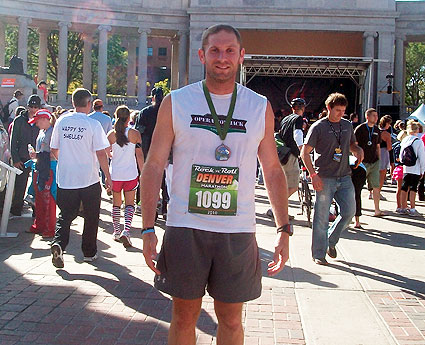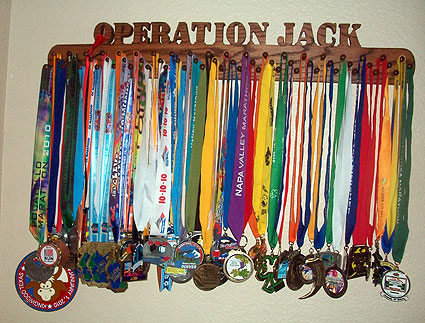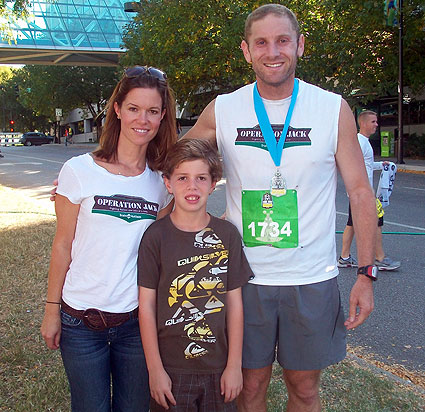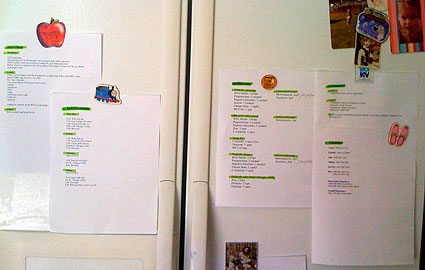I had a weekend recap almost completely worked up for today, but with the Boston Marathon opening and closing registration yesterday, I figured I’d address that because I’ve saw a lot of complaining about the way it all went down. Charity runners are getting a bad rap, and that’s just wrong.
Real quick, just in case you’ve never been here, I’m a marathon runner and a father of three. My middle child, 7-year-old Jack, is severely autistic. I decided I wanted to do something to try to make a difference in the autism community, so I’m attempting to run 61 marathons this year to raise money for a charity I’m a part of called Train 4 Autism. So far, I’m on track, through 50 of 61 with only 11 to go!
Anyways, registration for the 2011 Boston Marathon opened yesterday and I registered and got in. Registration was only open for eight hours or so and I’m glad I didn’t delay. Once it closed, though, I started seeing a lot of griping about charity runners on the Boston Marathon’s Facebook page, and that really annoyed me. So, I figured I’d address that today.
If you’re not familiar with the Boston Marathon and it’s qualifying standards, it’s fairly tough to get in. Men 18-34 need to run 3:10:59 or better (7:17 average pace per mile) and women 18-34 need to run 3:40:59 or better (8:23). Many marathon runners set qualifying for Boston as the ultimate goal and spend years getting there. I had to work extremely hard for about two years before I qualified for the first time. I went from a 2:29 in my first half marathon in December 2005 to a 3:07 full marathon in October 2007.
I went and ran Boston in 2008, and I consider it an annual reward for all the training I do. I train hard and really push myself. Boston is a race filled with great runners, great history and great support. I just love it.
In 2008, registration closed in about March. In 2009, it filled in either late January or early February — I don’t specifically remember, but it was around that time. Last year, the Boston Athletic Association made a gamble and sent off an email on October 29 stating that registration was almost full. I didn’t believe it, but I registered anyways, not knowing how many people would take the bait.
You get a number when you register, and fewer than 14,000 people had registered when that email went out. Shrewd move by the BAA — I was right! But within a week, registration was closed and I was in. I knew immediately that I would need to register on the first day this year. Boston had become a race with a reputation of closing early.
I registered yesterday morning, about five hours before registration closed. Then the next thing you know, I’m seeing all sorts of complains about charity runners on the Boston Marathon’s Facebook page, so I decided I’d write about that today. I wrote a quick post yesterday, but I’m following up with what I read about, because it really annoyed me
First of all, there are 26,700 runners in the race. There are 12 corrals and two waves. Each corral has 1,000 runners. 12,000 runners go in the first way and 14,700 go after that. From what I’ve read, there are 1,350 charity runners and about 3,900 entries that are somehow given out or sold through the Boston community to runners who haven’t qualified. So, you’re looking at approximately 5,250 runners out 26,700 who aren’t qualifiers.
Fewer than 5 percent of those are charity runners, and they START AT THE BACK! They’re not taking spots from anybody. They start behind all of the qualifiers, and based on the number of qualifiers, participants and wave one runners, I’m pretty convinced charity runners are add-ons, not spot stealers. Plus, since 1989, Boston Marathon charity runners have raised more than $100 million. Most charity runners are raising more than $3,000. And for that privilege, they get to sweep the course! I don’t know the exact number of entries sold yesterday, but it was probably somewhere in the neighborhood of 21,450.
Over the course of eight hours, that’s about 2,680 an hour. The registration rate probably accelerated during the day, because there were system issues early in the morning. So, take away those 1,350 charity entries and eliminate all the money they raise and give those entries to runners who achieve the qualifying times and you’re looking at registration closing a whopping 30 minutes later. Charity runners clearly did not cause yesterday’s problems.
Other folks are complaining about the entries given to the local community. Here’s something else I have a strong opinion about. The quality of the field and the history of the race are a big part of what makes Boston such a great race. But the local community does, too. They take the day off of work. They line the course and throw parties from start to finish. While residents of most cities complain about road closures, people in Boston treat you like royalty during race weekend.
People are excited to talk to you when they know you’re running the marathon. I had people applaud me when I walked into a bar after the 2008 race. The enthusiasm ranges from kids to college students to senior citizens. I gave hundreds of people high-fives during the race each of the three times I ran it because they come out and make the race what it is, so if they want a high-five, then I’ll give them one.
And along those lines, if the people of Boston want 3,900 entries, I don’t have any problem with the BAA giving those to them. It’s their race, not mine, and not some other fast guy’s, either.
It’s pretty simple, something we all learned in high school. Supply and demand. Entries are limited and there are a lot qualifiers out there. I expect the price to go up next year, and I wouldn’t be surprised to see the qualifying standards get tougher. In fact, I think they should. It’s pretty obvious that only a minority of the people who qualify and want to get in can actually get in the race.
The purpose of the qualifying times is to reward the best from each age group with a spot in the race, not to reward all people who can run a marathon in an arbitrary time. The qualifying levels need to be re-evaluated, because they’re not limiting the field. If that happens, I might not get in, and I’m fine with that. I’ll just work harder if I want to go back.
For now, I’m glad I’m in for 2011. And I’m bummed for people who qualified but didn’t register in time. But I’m really bummed hearing people try to lay the blame on charity runners and the Boston community. As individual runners, we don’t own the race and we don’t have a right to run in it.



